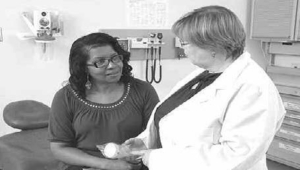FOR YOUR HEALTH: Talking With Your Health Care Provider About Kidney Health
 (NAPSI)—Chronic kidney disease (CKD) is a serious health problem, affecting an estimated 30 million adults in the United States. Yet more than nine out of 10 people who have kidney disease don’t know they have it. The sooner you find out you have kidney disease, the sooner you can take steps to prevent or delay serious health problems.
(NAPSI)—Chronic kidney disease (CKD) is a serious health problem, affecting an estimated 30 million adults in the United States. Yet more than nine out of 10 people who have kidney disease don’t know they have it. The sooner you find out you have kidney disease, the sooner you can take steps to prevent or delay serious health problems.

CKD means your kidneys are damaged and can’t filter blood the way they should. Kidney damage can cause wastes to build up in your body and can lead to other health problems such as anemia, bone disease and heart disease. You can have CKD without any symptoms, especially in the early stages of the disease, and over time it may lead to kidney failure. If your kidneys fail, you will need dialysis or a kidney transplant to maintain your health. You can’t reverse progressive kidney damage but you may be able to avoid or delay dialysis or a kidney transplant with medications and lifestyle changes.
Understand Your Risk for Kidney Disease
If you have diabetes, high blood pressure, heart disease or a family history of kidney failure, you are at risk for kidney disease. An estimated one in three people with diabetes, and one in five adults with high blood pressure, have CKD. Therefore, it’s important for people who are at risk for the disease to get tested.
Get Tested Early
Testing for kidney disease is simple—it involves a blood test and a urine test. Your health care provider uses a blood test to check how well your kidneys are filtering your blood and a urine test to check for protein in your urine.
Talk with Your Health Care Provider
If you have diabetes, high blood pressure, heart disease or a family history of kidney failure, talk with your health care provider about kidney disease. Stay informed and ask for the results of your kidney tests. You can start the conversation with your health care provider by asking these three questions:
- Have I been tested for kidney disease and how healthy are my kidneys?
- How often should I get my kidneys checked?
- What should I do to keep my kidneys healthy?
Take Steps to Protect Your Kidney Health
If you don’t have kidney disease but are at risk for it, your health care provider may suggest ways you can keep your kidneys healthy. Here are some steps you can take to protect your kidney health:
- Manage your diabetes, high blood pressure and heart disease
- Make healthy food choices
- Aim for a healthy weight
- Make physical activity part of your routine
- Get enough sleep—aim for seven to eight hours of sleep each night
- Stop smoking
- Find healthy ways to cope with stress.
Learn More
For more information about kidney disease, kidney failure, diabetes and more, visit the National Institute of Diabetes and Digestive and Kidney Diseases (NIDDK) website at www.niddk.nih.gov.
Responsible journalism is hard work!
It is also expensive!
If you enjoy reading The Town Line and the good news we bring you each week, would you consider a donation to help us continue the work we’re doing?
The Town Line is a 501(c)(3) nonprofit private foundation, and all donations are tax deductible under the Internal Revenue Service code.
To help, please visit our online donation page or mail a check payable to The Town Line, PO Box 89, South China, ME 04358. Your contribution is appreciated!


Leave a Reply
Want to join the discussion?Feel free to contribute!